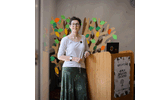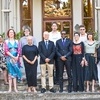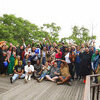Redefining child protection using AI
13 June 2025 | Story Kamva Somdyala. Photos Supplied. Read time 7 min.
After winning the recently-hosted University of Cape Town (UCT) and Harvard University surgical hackathon, the team known as Street Smartz envision their artificial intelligence (AI)-driven app’s future as ‘one safe child, one informed caregiver, and one empowered family at a time’.
The AI-driven app is an age-appropriate interactive game that will teach children about bodily autonomy, consent, unsafe/safe touch, secrets and boundaries, and guide them regarding where to seek help if they are feeling unsafe at home or at school. It is aimed at preventing sexual abuse of children and protecting them against abusers.
At the hackathon, hosted in April at UCT, teams worked intensely to refine their ideas under the mentorship of leading industry experts, surgeons, AI specialists and business strategists. Participants received hands-on guidance from mentors affiliated with Harvard, UCT, and the global tech and healthcare industries. The winning team included Ludolph Pedro, Bunono Frans, Wanda Madasa, Rahul Rama-Panchia and Simphiwe Malinga, who spoke to UCT News about the way forward.
Rahul Rama-Panchia: co-founder and CEO, third-year MBChB
Currently serving as deputy chairperson of the Faculty of Health Sciences (FHS) student council for 2025, Rama-Panchia said: “UCT is far more than a beautiful backdrop; but rather a beaker filled with ambition, where excellence is not merely encouraged but expected. While some may interpret the high-performance environment as pressure, I see it as an opportunity to be moulded into the best version of myself.”
“The AI aspect was initially quite daunting, as none of us have any experience in the tech space.”
“Participating in the UCT-Harvard hackathon was nothing short of transformative. It was an incredible opportunity to gather with peers from diverse academic and cultural backgrounds, united by a shared purpose: to tackle systemic health challenges using AI in a way that is both ethical and impactful. As team lead, it was deeply rewarding to witness the creativity, collaboration and growing confidence of my teammates as we shaped an idea into something tangible.”
The team is currently preparing for their next major milestone: the final pitch on Friday, 13 June – after which just five teams (from a starting list of 50 from around the world) will be chosen to present to a panel of venture capitalists, in the hope of making this app a reality.
Rama-Panchia added: “Street Smartz isn’t just a game. It’s a tool to bridge the gap between children, caregivers, schools and frontline services. It will provide real-time insights to caregivers, helping them understand what their children grasp – and more importantly, what they don’t. Each insight will be compared with short, clinically approved conversation prompts, so that even the most difficult conversations become more accessible for families. We are building this for South Africa; because protection should never be a privilege, but a basic right.”

Bunono Frans: co-founder and COO, third-year MBChB
When speaking about the conceptualisation of their winning solution, Frans said, “Initially I was very intrigued by the idea when Rahul proposed it, as it was unique, and addresses a need in our country. However, I was feeling slightly apprehensive; as this is a nuanced topic, and would have to be executed very well to ensure we do more good than harm. Ultimately it was the team’s enthusiasm, and knowing that our intention is rooted in the right place, that led me to feel we’d made the right choice on which innovation to follow through with.”
Frans continued: “The AI aspect was initially quite daunting, as none of us have any experience in the tech space. It is tremendously opportune that we get to create using this technology, as it has helped us throughout the innovation process.
“Coming from the South African context of an unequal healthcare system and uncertain future, it was empowering to view our problems through a new lens – as prompts for transformation that can create a new system which serves all people (including those who work within it) with quality care.”
Wanda Madasa: co-founder and CFO, third-year MBChB
“The journey to creating the model for Street Smartz was cumbersome at first. What has kept us going and striving towards a working model has been the vision that we share, and the passion that we have for social justice,” Madasa reflected.
“Street Smartz is a solution which addresses issues of education, health and social justice by leveraging artificial intelligence; and in this way, we sit between the borders of multiple social spheres.” When asked what AI techniques or solutions the team looked at to bring the innovation alive, Madasa shared: “It uses reinforcement learning, user modelling, prompt generation, multilingual natural language processing, anomaly detection, clustering algorithms, adaptive content via decision trees, text summarisation, data anonymisation and federated learning.”

Simphiwe Malinga: co-founder and CSEO, third-year MBChB
As chief strategy and ethics officer, Malinga had to grapple with the ethical implications of AI as a tool that can gather endless information, and determine how to ensure it gathers only essential data while maintaining privacy. “AI is slowly becoming a fixture in all our lives, and its implications are endless; so why not use it to empower individuals who lack autonomy, and are the most vulnerable? We are already working with established non-profit organisations (NPOs) – with experience in gender-based violence (GBV) and sexual abuse – to ensure the content of Street Smartz can provide optimised learning experiences within the game, to ensure learning outcomes are met.”
“Participating in the hackathon reminded me that healthcare isn’t confined to hospitals or clinics.”
Malinga added, “We are prepared to expand our venture beyond this, as we believe the valuation of our project can make a serious impact, and enable children with a powerful tool that can be life changing.”
Ludolph Pedro: co-founder and CCEO, third-year MBChB
As chief community engagement officer, Pedro reflected that “winning gave us momentum and access to incredible mentorship and resources that can help us refine the idea and take it further. Learning from industry leaders and renowned professors throughout the process was deeply enriching, and has inspired us to push the boundaries of what’s possible in healthcare innovation.”
Furthermore, “participating in the hackathon reminded me that healthcare isn’t confined to hospitals or clinics – it happens in homes, communities, systems, and even in creative spaces like this. It reignited my passion for medicine; not just to treat illness, but to help reimagine how care is delivered, especially in under-resourced settings. It’s a call to keep learning, growing, and collaborating beyond the bedside to bring about lasting, meaningful change.”
He added that the hackathon experience was filled with ambition, focus, energy, frustration, breakthroughs, laughter and reflection; all of which made the experience meaningful beyond just the outcome.
 This work is licensed under a Creative Commons Attribution-NoDerivatives 4.0 International License.
This work is licensed under a Creative Commons Attribution-NoDerivatives 4.0 International License.
Please view the republishing articles page for more information.
Faculty of Health Sciences News

Professor Anthony Figaji, head of Paediatric Neurosurgery at the University of Cape Town (UCT) and Red Cross Children’s Hospital, has been inaugurated as President of the International Society for Paediatric Neurosurgery (ISPN).
01 Dec 2025 Republished























